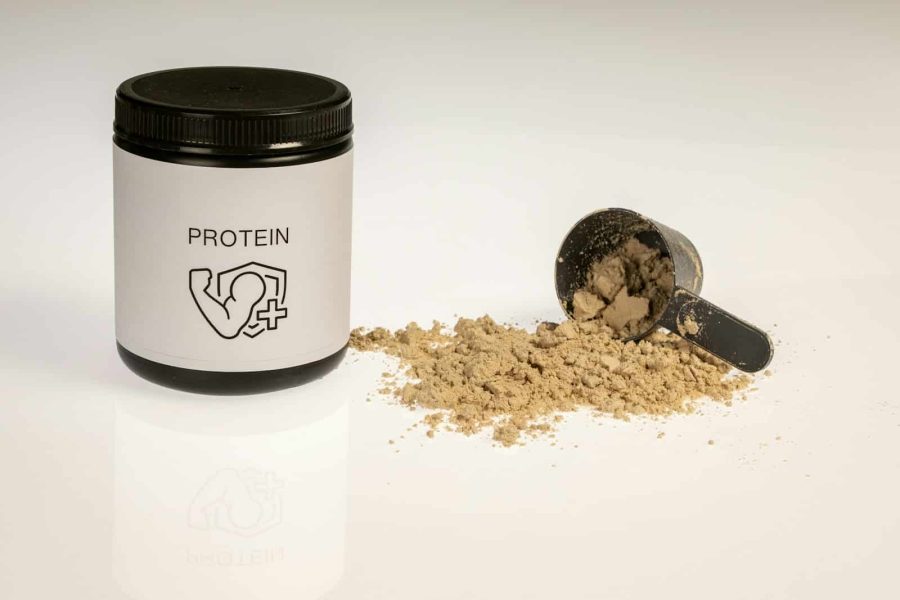Benefits of Protein Powder
Energy Boosting Mojo
You might not think of protein as your body’s main energy fuel, but it’s like having a secret weapon in your pocket. Slurp down some protein powder and it goes to work curbing that appetite, keeping muscles strong during those weight-shedding phases and giving your metabolism a little pep in its step. It’s like flipping on the lights when you’re feeling low on zip.
While carbs are the MVP for energy, protein steps up during times of caloric drought or when you’re really pushing those limits with physical activity. Without enough carbs, protein can back you up (Everlywell). But let’s not go nuts with it—too much can make your jeans tight or give your tummy something to complain about (Uptown Pharmacy).
| Energy Source | Role in Energy |
|---|---|
| Carbs | Top Dog |
| Fats | Runner-Up |
| Protein | Sub (when things get tough) |
Building Buff Potential
Protein powder’s reputation is rock-solid for beefing up those muscles—just ask any gym-goer or athlete. Stir some into your diet to get the amino acids that patch up and pump up your muscles. It speeds up post-workout bounce-back and helps beef up your muscle mass, which, you guessed it, feeds into your energy pool.
Different powders bring different perks. Whey protein, for one, is super fast to absorb and packed to the gills with amino acids. Get the 411 on it with our piece on whey protein powder benefits.
All protein powders aren’t created equal. Some get jazzed up with additives or artificial sweet stuff that your system might not dig. For a cleaner choice, give protein powder without artificial sweeteners a go.
Using the right protein powder can pump up your energy and support muscle growth big time. As always, balance your protein with how much you’re getting moving to keep any potential liver or kidney grumbles, tummy ecosystem tweaks, or skin woes at bay.
Got special diet needs? Check out something like protein powder for women, protein powder for keto diet, or protein powder for lactose intolerant to find what fits in with your lifestyle groove.
Types of Protein Powders
Finding the perfect protein powder is like picking the right dance partner—it can keep your energy hopping and your muscles jiving. With a lineup of choices out there, let’s break down the difference between whey, soy, casein, and egg white protein powders.
Whey Protein Overview
Whey protein heads the pack as a favorite for energy-lifters and muscle-builders. It’s quick to hit your bloodstream, and it’s packed with leucine—an amino acid that fuels your muscle power-ups. Plus, it’s loaded with BCAAs and cysteine, which are kinda like the body’s traffic controllers.
| What’s Good? | Whey Protein |
|---|---|
| Speed | Quick as a wink |
| Star Player | Leucine, Cysteine |
| Go Time | After workouts |
Get the skinny on whey protein powder benefits.
Soy Protein Benefits
Soy’s the plant-based powerhouse from soybeans. It puts a bit more time into digesting, making it a solid all-arounder for muscle upkeep and giving your immune system a solid high-five (Hy-Vee).
| What’s Good? | Soy Protein |
|---|---|
| Speed | Moderate pace |
| Special Perk | Immune boost |
| Best Shake | Veggie vibes |
Check out more in our scoop on protein powder for women.
Casein Protein Characteristics
Casein’s got the lazy vibe of the protein bunch—perfect for pre-sleep chillin’. It works the night shift, slowly releasing proteins for all your sweet muscle-recovery dreams (Hy-Vee).
| What’s Good? | Casein Protein |
|---|---|
| Speed | Slow and steady |
| Hangout Time | Midnight Club |
| Best Shake | Before bed |
Learn more with our guide on protein powder for seniors.
Egg White Protein Features
Egg white protein plays it cool, bridging the gap between whey and casein. It’s a solid option for dairy dodgers and can mix and mingle in post-workout drinks or even meal shakes.
| What’s Good? | Egg White Protein |
|---|---|
| Speed | In the middle |
| Besties with | Dairy-free folks |
| Best Shake | After workout or meal cooldown |
Getting a grip on the protein powder lineup ensures you have the right fit for your goals. Be it a turbo boost or night-time nurture, there’s one just for you.
For more scoops on picking the right powder, peek at our tips on best protein powder for building muscle and protein powder for lactose intolerant.
Considerations for Protein Intake
So, you’re thinking about adding some protein powder to your life? Great move! This stuff isn’t just for gym buffs—everyone from couch potatoes to grizzled veterans can benefit. Here’s a breakdown on how much protein you should be getting, whether you’re hanging on the couch or hitting the gym.
Protein Intake for Healthy Adults
Got a desk job or just enjoy binge-watching your favorite shows? Then you probably need about 0.8 grams of protein for every kilo you weigh (or 2.2 pounds—imperial unit fans, we see you). If you’re tipping the scales at 170 pounds, you’re looking at around 62 grams of protein a day. That’s enough to keep all parts of your body running smoothly. Handy, right?
| Weight (lbs) | Daily Protein Intake (g) |
|---|---|
| 130 | 47 |
| 150 | 54 |
| 170 | 62 |
| 200 | 73 |
This guide makes it super easy to calculate your personal protein needs, but remember, if you start sweating it out more, your needs might change.
Protein Intake for Athletes
Athletes, whether part-time warriors or serious competitors, need more protein for muscle upkeep and staying energized. Typically, you’re clocking in around 1.2 to 2 grams of protein per kilo. Ramp it up if you’re cutting weight—like really trying to get those abs to pop.
| Type of Activity | Protein Intake (g/kg) |
|---|---|
| Regular Exercise | 1.2 – 1.6 |
| Intense Training | 1.6 – 2.0 |
| Caloric Deficit for Cutting | 2.3 – 3.1 |
Building muscle without feeling like you’ve been hit by a truck? Get some high-quality whey protein into that diet! For more on why whey’s the way to go, head over to our whey protein powder benefits article.
Protein Intake for Older Adults
As the calendar pages turn, muscle mass is a precious commodity. Things get trickier post the big 7-0, and shocker nearly half of folks over 71 don’t get enough protein in their bellies. To keep that muscle party going, you should aim for about 1.2 grams per kilo.
| Age | Daily Protein Intake (g/kg) |
|---|---|
| < 65 years | 0.8 – 1.2 |
| ≥ 65 years | 1.2 |
Protein supplements to the rescue! They’re like a daily boost for your muscles. Curious about what’s best for the seasoned folks? Check out our guide on protein powder for seniors to find something perfectly suited to you.
Grasping these simple protein rules will help you maximize that energy and health. We’ve got more goodies in store, so be sure to read up on protein powder for meal replacements and protein powder without artificial sweeteners for a well-rounded view.
Choosing the Right Protein Powder
Picking the best protein powder can really kick up your fitness game and help hit those health targets. In this section, we’ll break down the difference in protein powders and how to pick one that suits you best.
Whey Isolate vs. Whey Concentrate
Whey protein is the go-to for boosting energy and pumping up those muscles. It’s what’s left from milk when cheese is made (Healthline).
Whey Isolate
- Purity: Gets processed more, so it’s purer with less fat and lactose, which means more protein.
- Protein Content: Packs in 90-95% protein.
- Lactose Content: Easier on the stomach for those with lactose intolerance.
- Cost: Costs a bit more because of the extra steps involved.
Whey Concentrate
- Purity: Has a tad more fat and lactose than isolate.
- Protein Content: Gives you about 70-80% protein.
- Lactose Content: A bit higher in lactose, so keep an eye if you’re sensitive.
- Cost: Friendlier on the wallet.
| Feature | Whey Isolate | Whey Concentrate |
|---|---|---|
| Protein Content | 90-95% | 70-80% |
| Lactose Content | Lower | Higher |
| Cost | Higher | Lower |
Whey’s loaded with BCAAs like leucine that help with bulking up and recovery (Healthline). For a deeper dive, check our piece on whey protein powder benefits.
Selecting Plant-Based Proteins
If you’re all about the veggie or vegan life, plant-based proteins are a solid pick. Here are some faves:
Soy Protein
- Description: Comes from soybeans and is a complete protein with all essential amino acids.
- Benefits: Helps in building muscles and keeping the heart ticking right.
- Consideration: Could be GMO, so look out for non-GMO tags.
Pea Protein
- Description: Made from yellow split peas, it’s full of BCAAs.
- Benefits: Gentle on allergies.
- Consideration: Often mixed with other plant proteins for a fuller amino profile.
Hemp Protein
- Description: Made from hemp seeds, it’s loaded with omega-3 and omega-6 fats.
- Benefits: Packed with fiber and easy to break down.
- Consideration: Not as high in protein but rich in other good stuff.
Rice Protein
- Description: Comes from brown rice and doesn’t cause many allergic reactions.
- Benefits: Easy on the tum and great for folks with a bunch of food allergies.
- Consideration: Often needs a buddy protein to make it complete.
| Protein Type | Key Benefits |
|---|---|
| Soy Protein | Complete protein, muscle building |
| Pea Protein | Allergy-friendly, packed with BCAAs |
| Hemp Protein | Healthy fats, full of fiber |
| Rice Protein | Allergy-friendly, gentle digestion |
Plant-based choices like soy, pea, hemp, and rice have plenty of amino acids and extras like immunity to allergies or good fats (Mayo Clinic).
Finding the right blend of protein powder comes down to what you like to eat and what nutrition your body needs. Whether you pick whey or plant-based powders, make sure your choice gels with your lifestyle and health goals. Need more advice? Peek at our guides on protein powder for weight loss and protein powder without artificial sweeteners.
Side Effects and Risks
Getting the scoop on potential hiccups and hazards of protein powder can help guide your supplement game with confidence.
Potential Side Effects of Protein Powder
Sure, protein powder might be your ticket to energy and muscle glory, but it ain’t all sunshine. Here’s what you might run into:
-
Liver and Kidney Health: Knocking back whey protein (WP) might nudge your liver into funky zones. Some studies show that WP can tweak liver markers like AST and urea in gym-goers and can even be a bit toxic in some rodent sidekicks (National Center for Biotechnology Information). Overdoing it or using it wrong might spell trouble for your liver and kidneys.
-
Acne: WP can be a double-edged sword—good for muscles, bad for your skin, especially if you’re a teenage dude or a bodybuilder. Ditching WP often clears up those pesky pimples. If your face starts looking like a pizza, try rethinking your protein game.
-
Gut Health: WP can mess with your gut’s vibe, changing up the mix of good bacteria and how your gut churns out important short-chain fatty acids. Keeping tabs on your tummy and choosing powders sans fake sweeteners might ease some of these woes.
-
Bone Health: WP has a bit of a bone to pick with, well, your bones. It can crank up your glomerular filtration rate but might also up the calcium in your pee, dropping the pH (National Center for Biotechnology Information). Eating enough calcium with your WP helps keep those bones sturdy.
| Potential Side Effect | Description |
|---|---|
| Liver and Kidney Health | Tweaks in liver markers, liver issues in some mice buddies |
| Acne | Pimples get worse for gym buffs and young guys |
| Gut Health | Shake-up in good bacteria, gut’s fatty acid production |
| Bone Health | More calcium in pee, lower pee pH |
Heavy Metals Contamination Concerns
Worried about heavy metals in your shake? Sometimes, nasties like arsenic, lead, cadmium, and mercury sneak in, thanks to where stuff is grown. Over time, this could be bad news for your health.
Here’s how to dodge that bullet:
- Choose Reputable Brands: Go for the protein powders from brands you trust, ones obsessed with quality and testing.
- Look for Certifications: Spot the labels that scream third-party tested, like NSF Certified for Sport, so you know you’re not downing heavy metals.
- Check Labels: Make sure your protein buddy’s label states it keeps heavy metals at bay.
Sniff around our pieces on protein powder for seniors and protein powder for meal replacement for more safe protein ideas.
Knowing what you’re dealing with takes the guesswork out, letting you savor the perks of protein powder without sweating the small stuff.
Boost Your Buzz: Energy with a Little Extra
Getting your mojo flowing is all about the right fuel. Sure, protein powders are vital for buffing up those muscles and bouncing back from a workout, but there’s more to the energy story than just proteins.
Power-Up Pills
Step aside, protein powder—there’s a whole toolbox of supplements that can jazz up your energy levels. Here are some game-changers:
- B Vitamins: The savvy crew that turns your chow into go-go juice. A B-complex can give you a full house of these energy ninjas.
- Iron: The oxygen taxi. When you’ve got low iron, it can feel like dragging a ball and chain.
- Creatine: The rocket fuel for short sprints or heavy lifts.
- Caffeine: Your morning star, perking up your senses and getting the cogs turning.
- CoQ10: This little powerhouse keeps your cells buzzing with life.
Try mixing and matching these with your usual shake to keep things zesty. Each has its own little secret sauce to keep you pepped up.
Your Protein Game Plan
Balance is key. Too much protein and you’re just asking for trouble, too little and you’re missing out. Protein’s like carbs’ more muscle-bound cousin—it gives you 4 calories per gram but moonlights in building and fixing stuff.
| Protein Rules of Thumb |
|---|
| 10% to 35% of total daily chow from protein |
| 0.66 grams per kilo of what the scale says |
So if you tip the scales at 70 kilos, you’re looking at around 46.2 grams of the good stuff a day. A bit more protein can help you get swole, fix up those post-gym aches, and give you a leg-up when the carbs run dry.
Protein’s not just for four-course meals. It pulls its weight during calorie crunches or when you’re racing up a hill and running low on carbs.
Trying to dial in your protein? Check out these hot picks:
Keeping an eye on your protein while tossing in some energizing extras will keep you feeling spry and ready to conquer whatever comes your way.










